
The European market potential for dried tropical fruit
In the medium to long term, the European market for dried tropical fruit is expected to show stable growth of 5-6% in volume annually. This growth is likely to be driven by changes in the consumption patterns of European consumers, including rising demand for healthier snacking options and a decrease in the consumption of sweet snacks. The United Kingdom, Germany, France, the Netherlands, Belgium and Italy offer opportunities for developing country suppliers.
Contents of this page
1. Product description
Dried tropical fruit is the product prepared from ripe fruit that is native to or grown in tropical regions (climatic zone surrounding the equator), processed by drying, either by the sun or other recognised methods of dehydration, with or without added sweetening agents (such as cane sugar) and food additives. Another method is to soak the fruit in syrup before drying, creating a very sweet, shelf-stable product. This is widely done for soft fruit, such as papaya and pineapple.
In some production methods (such as for banana chips), the product is not actually dried but fried in hot oil, like in the production of potato chips. Another characteristic of banana chips is that the raw material used is not ripe but green fruit. However, bananas and plantains in Europe are also increasingly being sold as naturally dried with a small addition of flour to avoid stickiness.
Depending on the species and variety, dried tropical fruit can be cut into different shapes. The most common are halves, slices, pieces, spears, chunks or cubes.
The most popular dried tropical fruit in Europe include dried bananas, mangoes, pineapples and papayas. However, other types of dried tropical fruit are also becoming popular, such as guavas, carambola (star fruit), durian, rambutan, passion fruit, jackfruit and pitahaya.
Dried tropical fruit is used at home, as a snack or cooking ingredient, elsewhere in hotels, restaurants and other places, and in the food industry, such as in bakery and confectionery products, or in breakfast cereal mixtures.
This study covers general information regarding the market for dried tropical fruit in Europe that is of interest to producers in developing countries. Desiccated coconuts and dates are not part of this study. Coconut belongs to the nut family (and not fruit), while dates are not tropical but sub-tropical fruit. For more specific information about these two products, see our studies on Desiccated Coconut and Dates.
Please see table 1 for the specific products and the product codes used for statistical analysis. Note that the range of dried tropical fruits is wider than statistical analyses can show (for example, dried mangoes and dried pineapples do not have specific statistical codes).
Dried fruit preserved by sugar (candied or crystallised fruit) is not included in the extensive statistical analysis. Dried mangoes and dried pineapples are also excluded from yearly statistical analyses, due to the absence of relevant statistical codes, but are included in the estimations and qualitative analyses.
Table 1: Products in the product group of dried tropical fruit
| Combined Nomenclature Number | Product |
| 08134065 | dried tamarinds, cashew apples, lychees, jackfruit, sapodilla plums, passion fruit, carambola and pitahaya |
| 08134050 | dried papayas |
| 08039090 | dried bananas |
| 08031090 | dried plantains |
Picture 1: Banana (plantain) chips

Picture 2: Dried pineapple
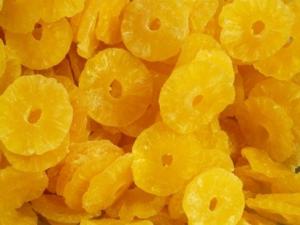
Picture 3: Sugar-infused dried papaya
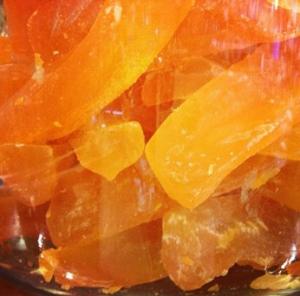
Picture 4: Dried passion fruit
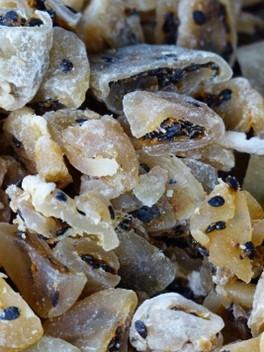
Source: Max Pixel, Pixabay, Flickr, Max Pixel
2. What makes Europe an interesting market for dried tropical fruit?
On average, European imports of dried tropical fruit have increased by 7% in volume until 2018, but the import slightly decreased in 2019. This decrease only shows the average supply, as the import of dried mango and dried pineapples continued to increase. On the other hand, the import of sweetened tropical fruit decreased in 2019. It seems that this trend did not continue in 2020, as the first analyses show that consumption of all dried fruit increased, both due to healthy snacking trends and the COVID-19 pandemic, which accelerated this trend.
Virtually all imports from outside Europe come from developing countries. In the next five years, the European market for dried tropical fruit is likely to increase with an annual growth rate of 5-7%. Regular fluctuations in imports will continue to be influenced by harvested crop volumes and price fluctuations rather than changes in demand.
In 2019, European imports of dried tropical fruit reached a volume of around 25-30 thousand tonnes. This volume includes internal European trade. The volume of import directly from developing countries is around 15 thousand tonnes, which means that about 50% of imported dried tropical fruit is re-exported within Europe. As Europe does not produce tropical fruit, consumption is equal to the estimated import volume – around 15 thousand tonnes.
The higher import growth rate in value compared to volume indicates that import prices have increased. However, prices are expected to stabilise, especially for dried mangoes. Overproduction of dried mangoes in Burkina Faso led to a price decrease in 2019. However, dried mango prices are stabilising in 2020. Dried mango imports account for around 40% of total European imports of dried tropical fruit (Figure 2).
3. Which European countries offer most opportunities for dried tropical fruit?
As Europe’s main importer of dried tropical fruit, the United Kingdom is an interesting focus market. Germany also provides specific opportunities, especially for organically certified dried tropical fruit. Other interesting markets are France, the Netherlands, Belgium and Italy.
The United Kingdom: the largest European importer
The United Kingdom is the largest European importer and market of dried tropical fruit within Europe. Imported quantities are mainly consumed within the country, with very small re-exports. Total consumption is estimated to be nearly 5 thousand tonnes. The largest quantities are dried mangoes and dried tamarinds. Dried tamarind is a specific product, mostly consumed by Indian and Pakistani diaspora within the United Kingdom.
Consumption of dried tropical fruit in the United Kingdom is driven by the healthy snacking trend and by the attractive taste of exotic fruit perceived by final consumers. Dried tropical fruit is also increasingly being used as an ingredient in breakfast cereals and fruit bars.
Leading suppliers of dried tropical fruit to the United Kingdom are the Philippines (Carabao dried mangoes, banana chips), Burkina Faso (organic dried mangoes), Ghana (dried pineapples, dried mangoes), Thailand (dried pineapples, dried tamarinds), Ecuador (banana chips), South Africa (dried mangoes) and India (dried tamarinds).
A specific characteristic of the UK market is the popularity of the carabao mango variety from the Philippines. While other European markets predominantly use other varieties of dried mangoes (such as Kent, Keitt, Tommy Atkins), UK companies are popularising the carabao variety as superior compared to others and sell it for higher prices. Another specific characteristic is the country’s sourcing destination preference for imported dried bananas. While almost all European importers source dried bananas mainly from Ecuador, the UK imports the largest quantities from Uganda and the Philippines.
Picture 5: Example of a tropical dried fruit brand in the UK
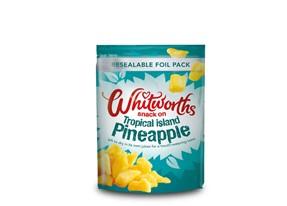
Picture 6: Example of a fruit bar with dried mangoes in the UK

The majority of dried tropical fruit in the United Kingdom is sold as a snack. The largest market shares are held by the private labels of retail chains such as Tesco, Sainsbury’s, ASDA, and Morrisons. Retail chains are commonly supplied via local packing and European brand companies and they rarely import retail-ready products directly from developing countries.
Leading brands selling dried tropical fruit include Whitworths, Forest Feast, Crazy Jack and Tree of Life. Dried tropical fruit is also increasingly being used as an ingredient in fruit bars (for example Fruit Doctor) and in breakfast cereals (for example Dorset cereals). Innovative dried tropical fruit snack products include fruit rolls and crispy fruit snacks.
The United Kingdom market offers specific opportunities for suppliers of FairTrade-certified dried tropical fruit, as the country is the largest Fairtrade products market in Europe. There are currently around 5,000 Fairtrade-certified products on sale in the UK.
Tip:
- Stay up-to-date with the dried tropical fruit market in the United Kingdom from the National Dried Fruit Trade Association UK.
The Netherlands: the largest European importer of dried bananas
In terms of imported quantities, the Netherlands was the third-largest importer of dried tropical fruit in the last five years. In 2019 however, the Netherlands took second place, mainly due to the increase of dried banana imports. It is estimated that at least 70% of all imported dried tropical fruit is re-exported to other European destinations. The largest destination for the Dutch re-export is Germany, followed by France.
The growing consumption of dried tropical fruit in the Netherlands is driven by the healthy snacking trend and the popularity of ‘exotic’ flavours. Apart from snacking, dried tropical fruit is increasingly being used as an ingredient in fruit bars, bakery and confectionery products and breakfast cereals.
The Netherlands is characterised by a high import share for sugar-infused dried tropical fruit (such as sweetened pineapples and papaya), especially from Thailand. The share of sugar-infused dried tropical fruit is expected to decrease in the medium to long-term, and no-added-sugar products are expected to gain market share. However, the import of sweetened dried tropical fruit in 2020 increased due to the COVID-19 pandemic. During the pandemic, many citizens stayed at home and increasingly consumed indulgence products, including sweetened dried fruit. Also sweetened dried tropical fruit cubes are a common ingredient in muesli breakfast cereals.
The Netherlands is the largest European importer of dried bananas (banana chips), with Ecuador as the leading supplier. In 2019, the Netherlands imported 2.2 thousand tonnes of dried bananas, which accounts for more than half of total European imports. More than 90% of imported dried bananas are then re-exported to other European destinations, with Germany as the leading target market.
More than 90% of all locally traded dried tropical fruit is sold by private labels of supermarkets such as Albert Heijn, Jumbo, health retail chains such as Holland & Barrett or discounters such as Lidl.
The import volume of organic tropical fruit in the Netherlands is relatively high and led by one of the largest European specialised organic importers, Tradin Organic (organic dried bananas, mangoes and papayas). Examples of organic-only brands with a range of dried tropical fruit are Smaakt, Lucy Superfood and Horizon.
Picture 7: Example of a banana chips in the Netherlands
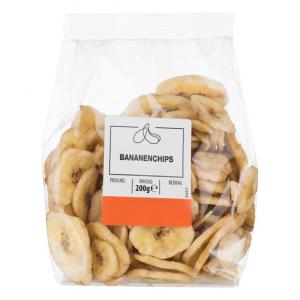
Source: Albert Heijn
Picture 8: Example of a pineapple snack in the Netherlands

Source: Albert Heijn
Germany: a huge and growing market
Germany is the third-largest European importer of dried tropical fruit, but the second-largest consumer, after the United Kingdom. When dried tamarinds are not counted (as they are not typical snack products), Germany actually ranks as the largest consumer of dried tropical fruit in Europe. Consumption has significantly increased over the last 2 years, since German retail chains included dried mango in a range of private label dried fruit snacks.
Germany is the fast-growing market. Some types of dried tropical fruits (such as dried natural mangoes or dried bananas with no added sugar) have experienced a very high market growth. Until a few years ago, those products were sold mainly in specialised stores, but they are now being sold even in big discounters such as Aldi or Lidl. Sales of dried tropical fruit in Germany are forecast to increase at a high growth rate. In the short term, sales in the German market will reach the same values as in the United Kingdom.
Germany is a particularly attractive market for organic dried tropical fruit, as the country is the largest European market for organic food. Also, sales of sugar-free and preservative-free dried tropical fruit are increasing. One of the market segments offering specific opportunities for suppliers of dried tropical fruit, is the fruit bar segment. There is an increasing number of fruit bar product launches that contain dried tropical fruit. Examples include Lubs, Alnatura, DM. However, some fruit bars are produced from fruit purees and not from dried fruit.
Examples of German dried tropical fruit brands include Seeberger, Farmer’s Snack, Kluth, or MorgenLand. Apart from snacks and previously mentioned fruit bars, dried tropical fruit is an important ingredient of breakfast cereal mixtures. Still, the usage of sugar-infused dried tropical fruit in breakfast cereals is larger than the application of natural dried tropical fruit. However, dried fruit without added sugar is expected to overtake sugar-infused fruit in breakfast cereals in the near future.
Tip:
- Find German traders of dried tropical fruit on the websites of the specialised German Association - Waren-Verein and in the German company directory – Wer liefert was.
Picture 9: Example of private label dried tropical fruit products in Germany
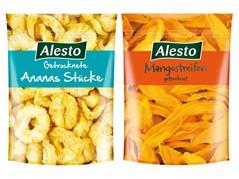
Source: Lidl
France: fast-growing and ethically aware market
France is one of the fastest-growing markets for dried tropical fruit, with an estimated growth rate of 15% per year over the last five years. France is especially an attractive market for French-speaking suppliers of dried tropical fruit from West Africa (such as Burkina Faso, Mali and Ivory Coast).
Private label brands of big retailers (such as Carrefour or Auchan) are very strong in sales of dried tropical fruit in France. Leading independent private brands include Maître Prunille and Brousse Vergez. Some of the brands that have a strong presence in the organic segment include Juste Bio and Daco Bello. Dried organic fruit is mostly used in breakfast muesli. However, some breakfast cereal producers use tropical fruit from freeze-dried purees instead of dried tropical fruit.
Dried tropical fruit is also sold in French supermarkets as unbranded, per weight or in simple transparent retail packaging. Some dried tropical mixes are sold as an ingredient for home-made muesli. All supermarket brands (private labels) in France started to use nutriscore labelling to label dried mangoes. Dried tropical fruit is usually labelled “C”, meaning that it has an average nutritional value. Muesli with dried tropical fruit as an ingredient can have an “A” label depending on the composition.
A lot of dried tropical fruit is imported to France through the Netherlands, but an increasing number of companies are now sourcing dried tropical fruit directly from producing countries. Those companies are investing in ethical sourcing and trying to help local communities in developing countries. Examples of such companies are Agro Sourcing and Direct Producteurs Fruits Secs.
Tips:
- Contact the French association for research in the fruit and vegetable sector (CTIFL) to learn more about the French market.
- If you are not from a French-speaking country, consider investing in French-speaking staff for easier access to the French market.
Belgium: importing from the Netherlands
Dutch companies supply significant quantities of dried tropical fruit to Belgium. This situation could provide opportunities for companies from developing countries to directly supply the Belgian market. Direct developing country suppliers to Belgium are Cameroon, the Philippines, India, Burkina Faso (dried mangoes), Thailand and Ghana. The share of dried tropical fruit with added sugar is still higher than in most other European markets.
Retail sales of dried tropical fruit in Belgium are led by the private labels of supermarket chain Delhaize. The market share of independent brands is small. Examples of independent brands are Bonner (dried mango), Adya and Nuts About Nuts. Ethical sourcing is important for Belgian importers, and some companies are investing in sourcing destinations such as Jua (which contributes 10% of sales to charity for sustainable projects in Uganda) or Fair Trade company Oxfam-Wereldwinkels.
Tips:
- See our study on Market Statistics & Outlook for Processed Fruit and Vegetables for more information about general trade developments within the European processed fruit and vegetables sector.
- Check relevant trade statistics with the tools of ITC TradeMap or Access2Markets.
Italy: growing imports and re-exports
Italy is increasing its import of dried tropical fruit. Dried tropical fruit is mainly consumed as snacks in Italy. Sales are dominated by private labels by supermarkets such as Coop, Conad or Carrefour. A very popular way of selling dried fruit is in small discount packages of €1 per package (for 100 g of dried fruit). The leading independent brand is Noberasco, but there are more brands such as Semplicemente frutta (by Euro company), Life or Ventura.
Italy exports significant quantities of imported dried tropical fruit to other European countries. This re-export is led by the presence of strong brands (such as Noberasco) in other European countries and the presence of strong Italian traders (such as Besana).
4. Which trends offer opportunities on the European dried tropical fruit market?
The increasing demand for healthy snacking combined with product innovation are the leading driving forces behind the growing consumer interest in dried tropical fruit in Europe. Also, sustainable and ethical production is becoming an important aspect for European traders and consumers.
To find out more about general trends, read our study about Trends on the European Processed Fruit and Vegetables Market.
Healthy snacking
A major trend that is in line with increased consumption of dried tropical fruit is healthy snacking. Consumers are searching for healthier alternatives for snacking between meals or even for snacks that can replace meals in full. Younger consumers who are taking more care of their general health and wellbeing no longer favour savoury snacks such as potato chips and other crisps. As a result, nuts and dried fruit are becoming increasingly popular as snacks.
Consumers are increasingly looking for flexible, light and convenient snacking options that they can eat on the go. According to a research by market research firm IRI, analysis of six markets – the UK, France, Germany, Italy, Spain and the Netherlands – showed that consumers are opting for healthier or lighter products. With their busy lifestyle, European consumers are replacing traditional lunch breaks with healthy snacking moments.
Clean label
Especially important for consumers are ‘clean labels’ on dried fruit packs. ‘Clean’ means that there are no additives used during the production process. Popular labels for dried tropical fruit packs are organic, gluten-free, sugar-free, ‘nothing added’, 100% fruit and similar. One of the new trends is production of additive-free dried tropical fruit. The main additives used to preserve the intense original fruit colour are sulphites. Producers that don’t apply sulphites often use the claim ‘sulphur-free’. The problem connected with ‘sulphur-free’ products is darkening of the fruit, which makes the fruit less appealing to consumers.
According to Innova Market Insights, a sharp growth occurred in ‘low sugar’ (+48% in 2018), ‘sugar-free’ (+35%), and ‘no added sugar’ (+29%) labels, which was largely driven by the rise in natural fruit snacks.
Innovative processing technologies and products
Freeze-drying technology, consumption of fruit and bars, new breakfast options and innovative snacking products are some of the main influences on the dried tropical fruit market. During ANUGA 2019 in Cologne (leading food exhibition), a lot of new products with dried tropical fruits were presented. Those include the following:
- Soft dried tropical fruit - Producers are starting to use rehydration (similar to the prunes production process) to increase water content in some types of dried tropical fruits and make them easier to chew. Examples: Frubis soft dried mangoes and pineapples (Portugal), Seeberger soft mango (Germany) and Rapunzel organic soft dried mangoes (Germany).
- Fruit bars with tropical fruit – The popularity of fruit bars has increased across Europe over the last several years. The main reason is the natural sweetener function of dried fruit, allowing the making of sweet products without added sugar. Exotic fruit is a popular flavour in fruit bars, although fruit purees are often used instead of dried fruit. Examples: Purafruta banana, goldenberry, mango and pineapple bars (Switzerland) or MÄT organic cocoa, mango and banana bars for children (Denmark). Purafruta is an example of the collaboration with a company from developing country that has successfully tapped into this trend. The Swiss company Fruit Group AG, in collaboration with the Colombian manufacturing and marketing company Prime Foods, launched dried tropical fruit snack bars without additives to the European market in 2018. To follow the healthy snacking trend, the bars are made from pure fruit without flavour enhancers, without added sugar and without additives. To cover the entire European market, the information on the product packaging is presented in German, English and French.
- Fruit rolls, sticks and balls – these innovative fruit snacks are made by rehydrating fruit purees. Tropical flavours are popular and include examples such as Tropics (Switzerland) or Sunvita (Hungary).
- Fruit chips – apart from bananas, other tropical fruits gradually also appear in the form of chips. Example: NSI pitahaya and mango chips.
- Freeze-dried tropical fruit, such as Lolo snacks (Hungary) or Giving Tree (the United Kingdom).
- Breakfast cereals such as Seedheart (Germany)
Sustainability and ethical production
Several sustainability initiatives are already active in the dried tropical fruit production countries, several of which have already been mentioned in the previous chapters. These trends are approached in more detail in the CBI processed fruit and vegetables trends study. Generally, consumers and retailers are increasingly interested in sustainably produced fruit products, including dried tropical fruit.
Some of the companies that focus on ethical production source their products from a specific country and via a project in the country. Sometimes, they have a partnership with a company from the sourcing country. One example of a European company that works like this is Tropicks from Switzerland. This company sells a range of dried tropical fruit from Ghana in several European countries, such as in the Netherlands.
Tips:
- Promote the various applications and nutritional properties of dried tropical fruit. However, avoid health or nutritional claims that are not substantiated by scientific evidence (nutritional analysis in case of nutritional claims). Check the Health Research Database of INC to find studies that have been published in scientific journals.
- Read the CBI Market Statistics and Outlook on Processed Fruit & Vegetables study to learn more about the general trade trends and the size of specific market segments.
- Check the websites of European trade shows and exhibitions to discover the newest trends. The most important trade fairs in Europe that are relevant to dried tropical fruits are SIAL (France, every even year in October), Anuga (Germany, every uneven year, in October) and BioFach (Germany; organic products, every year in February).
- See our product studies on dried mango to learn more about exporting this specific product to Europe.
This study was carried out on behalf of CBI by Autentika Global.
Please review our market information disclaimer.
Search
Enter search terms to find market research